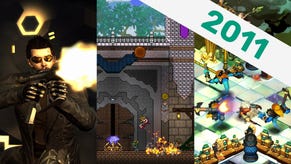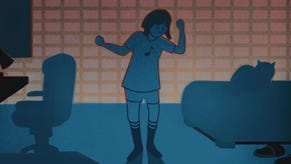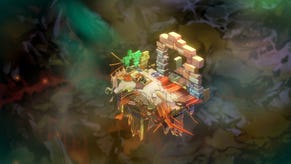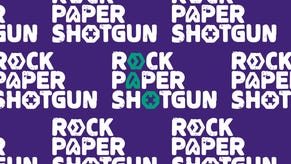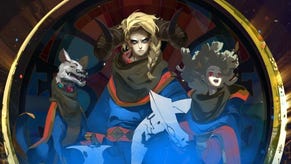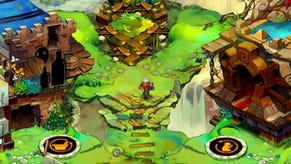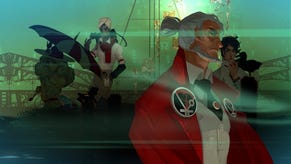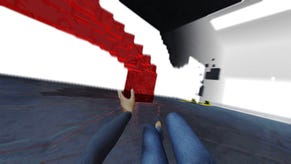True Grit: Back To Bastion
A Stranger, in a strange land
Supergiant's sombre action-RPG Bastion was released on PC a few weeks back; John has already told you what he thinks of it, but in the last few days I've been exploring its shattered world for myself. It's put me in a funny place. Spoilers of a sort await, so don't read this unless you've played the game, don't intend to, or don't give a toss about narrative events in a hack and slash game.
I was sad when it ended. Forlorn, even. For me, that isn’t a regular state of affairs. Even with games I love, I’m oddly grateful when they wrap up - there’s a sense of accomplishment to it, and a relief that they didn’t string things out too long or defeat my sense of goodwill with a BioShock-boss or one too many achingly earnest cutscenes. Bastion, though: a true wave of sadness hit me as the credits rolled.

Why? Well, that’s thing. It’s all to do with the entire game, not the ending itself or even the fact that it had ended before I wanted it to end. For several hours, I’d been wrapped in a confluence of watching an extraordinary flying world crumble before my eyes, moody neo-cowboy music, a near-constant, constantly grim-yet-fatherly Sam Elliott-style narration and the sense of being caught on the horns of a moral dilemma I was powerless to do anything about. All of these are positives, because Bastion arranges them together with stout purpose - purpose of storytelling, and purpose of atmosphere. They mean that the game always has an air of sadness, and can only end with sadness. There is triumph. There is choice. There is, even, the option to start again in a Plus mode, with all my weapons and upgrades carried over.
I can’t overstate how strongly I don't want to that, much as I’m grateful for the offer. Bastion told its tale, it told it movingly and it told it strangely - why would I want to pollute it with an overpowered replay? (There is a clever narrative justification as to why you might replay, depending on which ending you attain, and it makes me smile. Sadly. I still don’t want to replay. Not ever.) I wanted to go back to my Bastion, to carry on rebuilding the world and building myself. Resolving the Bastion's problems, one way or another, meant that was an impossibility. What began in sadness and loss ended in kind, even if I achieved heroic things first.
There are three Bastions. There’s the game on my screen, the game in my ears and the game in my head. The second of these is, I think, the most powerful. I don’t know whether the Stranger’s narration was always in the design brief, or added later when other expository techniques were deemed to have failed. Either way, it transforms the game. It’s the Portal effect, to some extent - a potentially untrustworthy narrator talking to you at all times, and your only guide to what’s going on whether or not you put your faith in him. Kid's got no place else to go.
Even having finished the game, I don’t know whether I trust The Stranger/Ruck. He has noble intentions, but at some point before that he had dark intentions; he claims to be trying to fix the damage he helped wreak, the accidental genocide of his own people as a result of deliberate attempted genocide of another, but he takes his damn time sharing any of this. He takes even longer to reveal that even if he can fix it, the cost will be terrible - and the original tragedy might just happen all over again. On his orders, I kill so many of the creatures I'm working to save. It's for the greater good, he says. I listen. He has a warm, knowing voice. He sounds exactly like a frontier hero should sound. He knows more me about me than I do, whether from straight-up wisdom or a strange, secret link he's not sharing. I have my theories. We all have our theories. I listen. He talks all the time, but he never says too much - each phrase is a blessing of brevity, loaded with subtext and ambiguity. Kid could listen to him all day.
But I don’t trust him, not for one second. I’ll do what he says, of course. I have no choice. There’s nothing else to do. His voice in my ear spurs me on. The soundtrack, an immediately memorably, immediately affecting hybrid of old West, old East and something new, something electronic, something dark, something adventurous, spurs me on too. I have listened to it many times since. Parts of it echo around my skull all day. Kid can't hardly sleep for the music he hears all the time. Kid knows it's time to move on now.
Then there’s the game in my head - the hack and slash game, the simple, Diablo-like saga of personal reward and personal greed. Unlocks, cash and experience. I know this song all too well. I’ve heard it a thousand times. I’ve grown tired of it a thousand times. It know it means I’m selfish, I’m compulsive, I care too deeply about things without depth. Bastion is different. Bastion has what Torchlight does not, what Titan Quest does not, what Diablo does not - it has purpose beyond my own interests. I want to know what happened. I want to undo what happened. I want the bigger guns and sharper blades and more apocalyptic skills because they will help me to find out what happened and to undo it. Kid means to keep on, no matter what comes for him.
I even did almost all of the Challenges, those completionist-pleasing vignettes of meaninglessness, because of this. I wanted it all, but I felt I wanted it for a real reason. Somehow, beating Diablo’s devil, the actual devil, could never manage that sense of import. I was only in that game for the loot, the loot for loot’s sake. This game’s devil, though - the unseen, non-corporeal devil of terrible tragedy - that’s a bugger I don’t want to see win the day. D’you know, Bastion is a dungeon-running game without a climactic boss fight to speak of? I only just realised that. It didn’t need one. I didn’t feel the lack of one. This collapsing world and its steely narrator conveyed far more threat than even the most gigantic monster ever could. You don't need a boss fight for menace and you don't need a boss fight for closure. I wish more action games realised the same thing. Kid knows he'll never have it better, even though he's never seen worse.
Finally, there’s the game on my screen, and there I'm speaking purely in terms of visual aesthetics. That one I don’t like quite so much. I love how Bastion sounds and I gave myself utterly to how it played, but at times I can only just tolerate how it looks. I suppose the jarring juxtaposition of, say, the gravelly tones of the Stranger and his squat, giant-eyed Nintendian appearance is a deliberate one. I like the colour, I like the monsters, I like the animations, I love the transforming, reforming, disintegrating tile-based world (the latter so much so that this paragraph is halfway to wildly inaccurate), I even like the frozen, horrifyingly smiling victims of The Calamity. The occasional, hyper-cute, hyper-deformed living survivors of the people I’m in theory trying to save or avenge? Can barely stand to look at ‘em. They don't match up with the other two games. I don't know what I would want Bastion to look like, but I know it's not this. Screenshots alone would have turned me right off Bastion. In fact, I only started playing because overwhelmingly positive word of mouth overcame the faint lip-curl I’d made in response to the images I’d seen. I was rewarded. Richly rewarded,
Bar the very occasional mortifyingly soft-focus, mawkishly child-faced but mercifully static cutscenes, the game’s look kept out of my way and in return I let my distate for such minor things slide, revelled in Bastion's bittersweet apocalypse, and focused all the more on the game in my ears and the game in my head - how they made me feel and where they took me. Those are two of my favourite games of the year, games that remarkably made a virtue of both sadness and of self-interest. I’m heartbroken they’ve ended. I never want to play them again.
And I just don’t understand why anyone wouldn’t want to have the musket equipped at all times.





